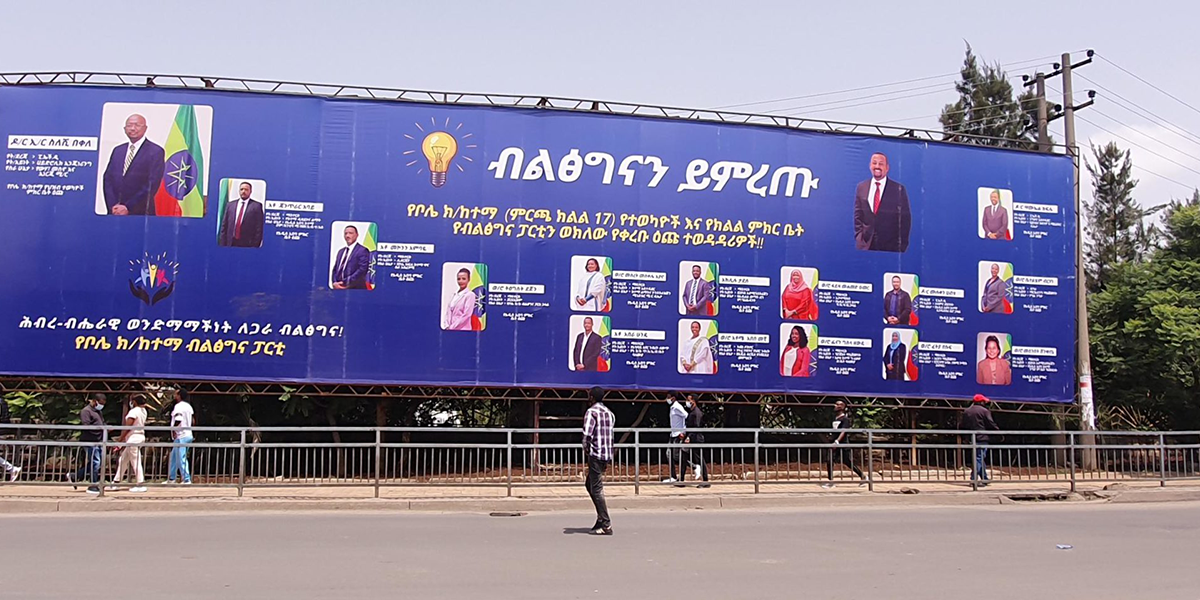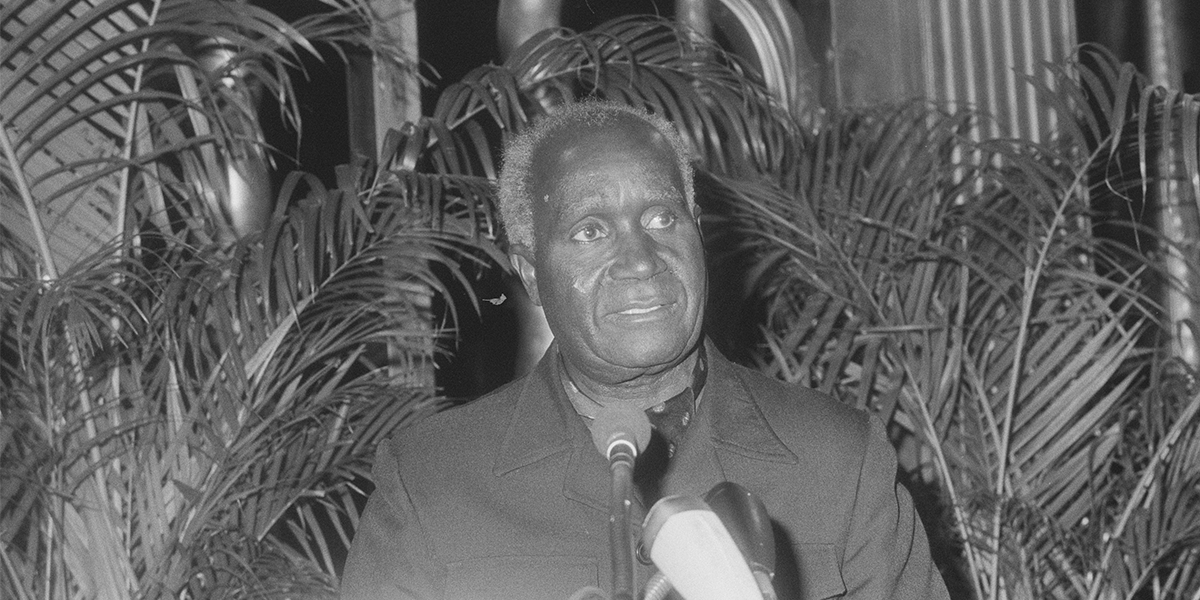News
Ethiopia's Choice After Election: The Plough or the Kalashnikov
Ethiopia hosted a much-delayed general election on 21 June 2021 amid not only Covid-19, but ongoing civil war, regional instability and continuing friction with its neighbours. With the right set of following actions, the elections could yet prove the start of Ethiopia's democratic transition.

“The population is being moved out of here, and here,” pointed out the UN officer on a map of Ethiopia's northernmost Tigray region.
“Western Tigray is being extensively depopulated,” he said tapping the location of the now 'ghost-town' of Humera, once an important regional agricultural centre.
“What we are seeing,” he notes, “is that Tigrayans are being 'encouraged' to abandon their homes and lands in large areas of the southern part of eastern Tigray as well. What we hear repeatedly,” he adds in echoes of the former Yugoslavia, “is the need to 'clean the bloodlines' of Tigray.”
Ethiopia hosted a much-delayed general election on 21 June 2021 in the middle not only of Covid-19, but an ongoing civil war in Tigray, instability in the Oromiya and Amhara regions and continuing frictions with its neighbours, notably Sudan.
With the right set of following actions led by Prime Minister Abiy Ahmed, the elections could yet prove the start of Ethiopia's democratic transition.
Renowned for his self-confidence and energy, Abiy was appointed Prime Minister in April 2018 after the resignation of Hailemariam Desalegn in the face of ongoing domestic protest and violence. At the time, Abiy appeared to be a man on a clear mission to reshape regional relations and domestic politics, for which he quickly earned domestic sympathy and international support, being awarded the Nobel Peace Prize in 2019 for making peace with Isaias Afwerki's neighbouring Eritrea. Ethiopia's relationship with its one-time guerrilla ally had collapsed into bitter warfare in 1998 ostensibly over the border town of Badme, costing an estimated 100,000 lives during three years of fighting.
Abiy's rise also signalled the relative demotion of the Tigrayan People's Liberation Front (TPLF) as the major political power in Ethiopia with the dissolution of the TPLF-dominated ruling Ethiopian People's Revolutionary Democratic Front (EPRDF) coalition of four ethnically based parties formed in 1988 to fight the “Derg” Marxist regime of Colonel Mengistu Haile Mariam. The EPRDF was replaced by the Prosperity Party in December 2019. When Abiy postponed national elections scheduled for August 2020 on the grounds of Covid-19, the TPLF upped the political ante by holding its own regional election the following month.
The government in Addis Ababa then launched a military operation into Tigray in November 2020 aimed at decapitating the leadership of the TPLF. The coordination of Eritrean and Ethiopian forces along with Amharic irregulars and drones from the United Arab Emirates suggests that the plans for the invasion had been laid some time before.
There seems little doubt, too, that the TPLF did instigate the military conflict by attacking federal bases in Tigray to get their hands on the heavy weaponry that they lacked. Underlying the TPLF rebellion was a fundamental refusal to accept the loss of power in 2018 with the installation of the Abiy government, and more basically a deluded assessment of their ability to maintain the same level of control over the national government that they had enjoyed until then. There was absolutely no way that most of Ethiopia, and especially both Oromo and Amhara, would accept a government essentially run by a group with a base among some 6% of the population.
The resort to war represented a massive leadership failure in Asmara, Addis and Mekelle, one compounded by a series of miscalculations about how quickly the war would end — Abiy promised just days at the outset and declared victory in three weeks — and by the TPLF, which apparently did not anticipate the Eritrean incursion.
The Tigrayan conflict also, however, came on the back of several years of ratcheting domestic political instability, mainly in the Oromo region, home to 35% of Ethiopia's 110 million population.
It has also brought economic stresses in Africa's second-most populous country, compounding the effects of Covid-19.
Touted as the first free and fair election in Ethiopia by both government and some opposition figures, the organisation of the June 2021 election was imperfect. It could not be held countrywide given a combination of security concerns and registration problems. The contest of more than 100 of the total of 547 parliamentary seats was postponed, including 38 in Tigray, while, in a further 104, only the ruling Prosperity Party put up a candidate.
Political space was limited. The Ethiopian Human Rights Commission reported 9,000 people had been detained in 2020, for example, following outbreaks of violence after the killing of the popular Oromo singer Hachalu Hundessa which left hundreds dead, while on election day itself there were reports of hindered access to ballots and acts of violence, causing delays in the voting process.
Opposition leaders such as Merera Gudina of the Oromo People's Congress, described the event as “political theatre”, that the elections would not, from his perspective, deliver “Ethiopia's three greatest needs of peace and stability, the birth of a democratic state after 3,000 years of authoritarianism, and meaningful economic development.”
On the contrary, the dismemberment of Tigray will only deliver a basket case dependent on the charity of international donors.
The capital of Tigray, Mekelle, has all the signs of a city under stress, and in conflict.
The Toyota Land Cruisers of humanitarian organisations plough the streets flying their flags literally and liberally stickered with signs illustrating they were unarmed. The number of NGOs in Tigray had, by June 2021, increased to over 100, most of them focusing on food delivery and shelter. And then there is a welter of UN bodies, including Unicef, UNHCR, the United Nations Office for the Co-ordination of Humanitarian Affairs (Unocha), and the “Super Bowlers” of food supply, the World Food Programme (WFP). Many performed a critical function. “Without the likes of MSF,” says one UN officer, “the hospitals would have been overwhelmed.”
Ethiopian military forces are clearly evident in Mikelle's markets and streets, on foot patrols and cruising around in their crudely camouflaged “technicals”, usually with a Ray-Banned soldier “riding” behind a loaded machine-gun.
Tigray's economy is badly broken. Largely dependent on agriculture, land has, too, become a weapon of war.
Haile is the founding president of Mekelle University. A soils specialist, he estimated before the election that just 20% of lands had been harvested, “setting the stage for a catastrophe in the next year”. Access to food and ongoing sexual violence have reportedly been weaponised to cause Tigrayans to flee, with countless harrowing stories of lives destroyed in the process.
The politicisation of access to food and aid largely explains Ethiopia's history of famine. In such an environment, at best the election could tick off the constitutional necessity of having one — and offer a step in the right direction for reform.

These reforms will immediately have to include improving humanitarian access into Tigray and getting the Eritreans to leave. The latter will be easier said than done even though “The longer the Eritreans stay in Tigray, the more the conflict will intensify and the longer it will continue,” as one Addis-based diplomat put it.
The problem for Abiy is, however, that the Eritreans are needed for him to maintain a military grip over the estimated 20,000-strong (and growing) Tigray Defence Forces (TDF).
“Ethiopia's politics is zero-sum,” says Dr Gudina, whose Oromo party elected to stay out of the June election. “Those that are ruling want to control most things. But simply picking people and giving them positions is not akin to a democracy, and nor is it a way to run the country properly and fairly. You can't,” adds the university professor, “impose a roadmap of only one person. With millions of young people without employment, the solution has to be,” he says, “democratic stability and governance.”
Running an election with 37.4 million registered voters choosing from more than 9,000 candidates from 47 registered parties across 49,407 polling stations represents a considerable achievement, though the success of the elections is to be determined by what happens afterwards, not on the day.
The key factor in the election is not simply Abiy's margin of victory, but whether it provides the government with some means of recruiting and identifying groups and individuals, especially in Oromiya and Amhara, which it is prepared to recognise as having some basis of support and with which it will be able to establish a working relationship.
There is some cause for optimism. There have been key steps in liberalising the political space, not least the establishment of a Human Rights Commission with teeth. Daniel Bukele notes that while “there is no denying the problems, the good news is that we are staging much improved and inclusive election than in the past.”
This highlights the need for an inclusive national dialogue to address the constitutional tension between the powers of a unitary state and ethno-nationalist provinces, the agenda for electoral reforms, the relationship with Tigray beyond just the TPLF, and key economic issues, especially around land reform.
Abiy could now seize the initiative and surprise the world, but he will have to find the means and make the concessions to back up his rhetoric. Without a reconciliatory agenda, as Professor Mitiku observes, “My fear is that, if the farmer's hand does not hold the plough, it will hold the Kalashnikov.” By June 2021, more than 1,000 students from his university had left to join the TDF “in the bush”.
None of Tigray's problems is going to be resolved without an end to the fighting. That will require a political settlement and that, in turn, demands dialogue and reconciliation. At the very least, the longer the Tigrayan war goes on, the more difficult it will be to solve, and the longer the period of recovery.
The immediate post-election period offers a window to put this right.
This article is based on the discussion paper 'The Plough and the Kalashnikov: Ethiopia After the Election'. It was originally published by Daily Maverick.


